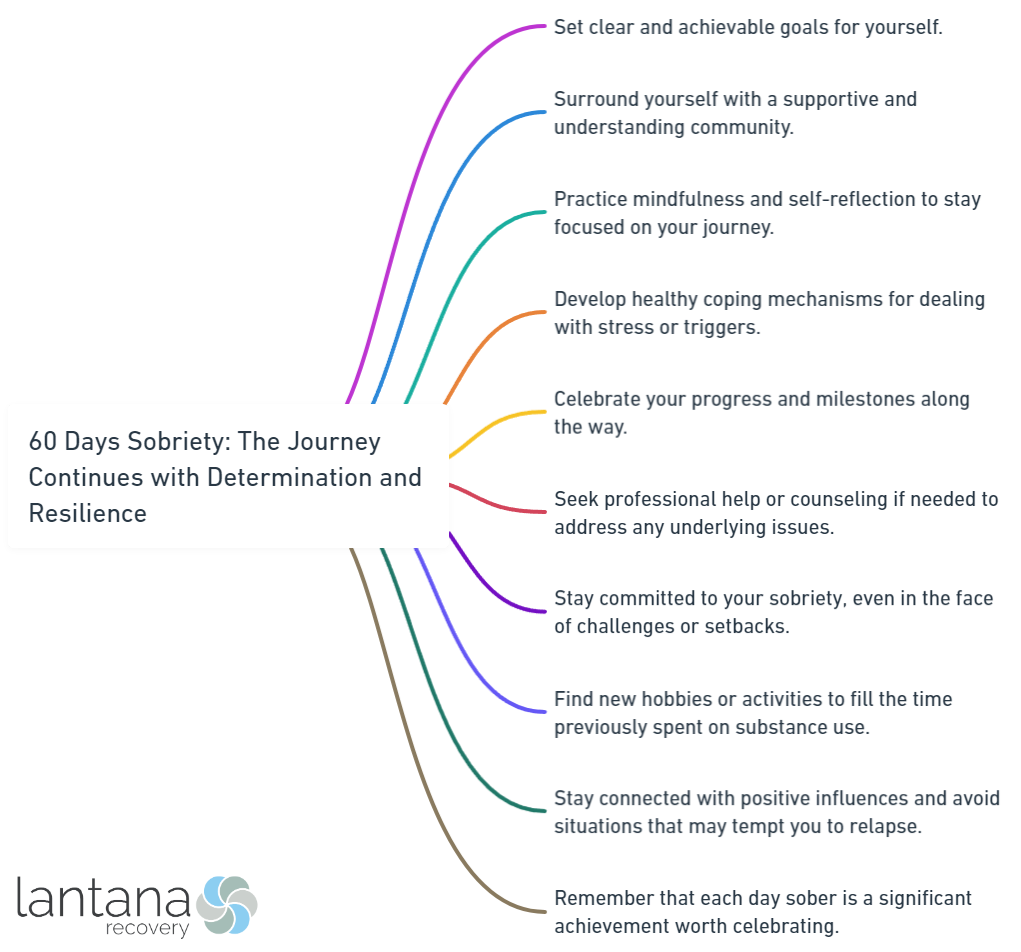Sobriety is a journey of transformation and self-discovery that requires determination, resilience, and unwavering commitment. Choosing to live a sober life is a decision that brings about profound changes, not only physically but also emotionally and spiritually. In this article, we will explore the importance of sobriety, the challenges and rewards of pursuing 60 days of sobriety, and strategies for staying determined and resilient on this journey. We will also discuss how individuals can inspire others by sharing personal stories of sobriety and offering support and encouragement. Embarking on this 60-day sobriety journey requires recognizing the need for change, making a strong commitment, and embracing the challenges along the way. Let us delve into this remarkable journey of transformation and growth.

Why Sobriety is Important
Sobriety is important for a healthy and fulfilling life. Why sobriety is important? Well, living a sober lifestyle offers many benefits and can positively impact different areas of life. Why is sobriety important for improved physical health? Sobriety eliminates the harmful effects of alcohol or substance abuse on the body. It reduces the risk of liver disease, heart problems, and why is sobriety important for other health issues related to excessive alcohol consumption.
But why is sobriety important for mental clarity? Sobriety improves cognitive function and mental clarity, leading to better decision-making, problem-solving, and emotional stability. When it comes to relationships, why is sobriety important? Sobriety fosters healthier relationships with family, friends, and loved ones. It improves communication, trust, and reliability, creating more meaningful connections.
In terms of financial stability, why is sobriety important? Eliminating the costs of alcohol or substance abuse can enhance financial stability. Sobriety allows individuals to save money, invest in their future, and achieve financial goals.
But why is sobriety important for personal growth? Sobriety creates opportunities for personal growth and self-discovery. It allows individuals to focus on their passions, cultivate new hobbies, and explore their potential.
Furthermore, why is sobriety important for being a positive influence? Choosing sobriety can inspire and motivate others facing similar challenges. By sharing your story and offering support and encouragement, you can become a role model.
Committing to sobriety is a courageous decision that brings significant positive changes. Each person’s journey is unique, and staying determined and resilient is crucial throughout.
If you or someone you know is struggling with alcohol or substance abuse, seeking professional help and building a strong support system is essential. Recovery is a lifelong journey, and support from loved ones, therapy, and counseling greatly contribute to successful sobriety.
The Journey of Sobriety
The journey of sobriety is transformative and requires dedication and resilience. It leads to a healthier and happier life.
- Importance: The journey of sobriety is crucial as it improves physical and mental well-being, restores relationships, and regains control over one’s life. Committing to sobriety is the first step towards a better future.
- Overcoming challenges: The journey of sobriety may involve difficult withdrawal symptoms, but with determination and support, these challenges can be overcome. Building a strong support system provides encouragement and accountability. Taking care of oneself reduces stress and fosters overall well-being.
- Discovering new interests: The journey of sobriety opens up opportunities to explore new hobbies and interests, bringing joy and fulfillment.
- Staying determined and resilient: Setting realistic goals and celebrating milestones boosts motivation in the journey of sobriety. Managing cravings and triggers with healthy coping mechanisms is crucial. Learning from relapses and moving forward is an important part of the journey.
- Inspiring others: Sharing personal sobriety stories motivates others in their own journey of sobriety. Supporting and encouraging others creates a positive impact on their sobriety journey.
The journey of sobriety is unique for each person and requires commitment, perseverance, and a strong support system. Embracing this journey leads to personal growth, improved well-being, and a brighter future.
Need some motivation of sticking to your sobriety journey? Read our article on one year of sobriety to find out how giving up substance abuse can improve your quality of life.
Making the Commitment
Making the commitment to sobriety is crucial for a healthier and happier life. It involves taking ownership of your actions and recognizing the need for change. You should have a clear understanding of how alcohol or substance abuse has affected your life and a determination to make a positive change.
To make the commitment, set specific and achievable goals of staying sober for a certain period, improving relationships, or prioritizing self-care. Realistic goals will keep you focused and motivated.
Having a strong support system is essential. Surround yourself with supportive friends, family, support groups, or counselors who understand your journey and can offer encouragement and guidance to improve your chances of success.
Professional help may be necessary, especially if addiction is involved. Therapists and counselors can provide the tools and strategies needed to overcome challenges and stay committed to your goals.
Embracing a new lifestyle is an important part of sobriety. This can include changing daily routines, finding new hobbies and interests, and developing healthy coping mechanisms. Focus on personal growth and self-improvement to solidify your commitment and create a fulfilling life without substances.
By taking responsibility, setting goals, building a support system, seeking professional help, and embracing a new lifestyle, you are making the commitment to pave the way for a successful journey towards a sober and healthier future.

The Challenges and Rewards of 60 Days Sobriety
Embarking on a 60-day journey of sobriety is no easy feat, but the challenges and rewards that await are worth every step. From overcoming withdrawal symptoms to building a strong support system, this section dives into the ups and downs of this transformative experience. We’ll also discuss the importance of self-care and how discovering new hobbies and interests can fuel personal growth on this remarkable path towards determination and resilience. Let’s navigate the twists and turns together, drawing inspiration from those who have powered through and emerged stronger on the other side.
Overcoming Withdrawal Symptoms
Overcoming withdrawal symptoms is crucial in the journey to sobriety. It’s important to be aware of physical and psychological symptoms that may occur during this time. Physical symptoms can include nausea, sweating, tremors, and headaches. Psychological symptoms may manifest as anxiety, irritability, depression, and intense cravings. Seek professional help or join a support group to effectively manage withdrawal symptoms.
Engaging in self-care activities like regular exercise, adequate sleep, and a healthy diet can boost overall well-being and promote resistance to cravings. Applying relaxation techniques such as deep breathing, meditation, and mindfulness can reduce anxiety and stress levels. Staying hydrated by consuming plenty of water and fluids enhances physical and mental health during withdrawal. Overcoming withdrawal symptoms takes time and resilience.
With the right support, self-care practices, and determination to stay sober, individuals can successfully navigate this phase and continue their journey to lasting sobriety.
Building a Strong Support System
Building a strong support system is essential for individuals in sobriety. When it comes to building a support system, here are some steps to consider:
- Reach out to friends and family: Inform your trusted loved ones about your decision. They can offer emotional support throughout your journey.
- Join support groups: Take part in Alcoholics Anonymous (AA) or Narcotics Anonymous (NA) meetings. Connect with people who are facing similar challenges, share your experiences, and receive valuable advice.
- Find a sponsor: A sponsor is someone who has achieved sobriety and can guide you. They provide accountability and support during temptations or difficult times.
- Participate in therapy or counseling: Seek assistance from addiction specialists who can help you develop coping mechanisms and address underlying issues that contribute to substance abuse.
- Engage in sober activities: Surround yourself with supportive individuals and participate in activities that do not involve alcohol or drugs. This will help create a positive and reinforcing environment.
Remember, building a strong support system takes time and effort. Be patient with yourself and others, and prioritize your well-being. Studies have shown that active engagement in peer support significantly help with maintaining sobriety. According to a research identifying the benefits of sober living homes for maintaining sobriety, “interactions among recovering peers offer unique opportunities for feeling understood, recognizing vulnerability in others, identifying with the recovery processes of others, receiving supportive confrontation, and engaging in mutual accountability.” (Motivation to maintain sobriety among residents of sober living recovery homes, Polcin, Korcha, 2015)
The Importance of Self-Care
The importance of self-care cannot be overstated in the journey of sobriety. Taking care of oneself physically, mentally, and emotionally is crucial for maintaining sobriety and overall well-being.
- Physical self-care: Regular exercise, balanced and nutritious diet, and sufficient sleep are essential for physical health. Exercise not only improves fitness but also boosts mental well-being. Eating healthy provides necessary nutrients, while adequate sleep promotes rest and recovery.
- Mental self-care: Practicing stress management techniques, such as mindfulness or meditation, reduces anxiety and improves mental clarity. Engaging in activities that bring joy and relaxation, like reading or spending time in nature, contributes to mental well-being.
- Emotional self-care: It is important to acknowledge and express emotions in healthy ways. This can include journaling, talking to a trusted friend, or seeking support through therapy. Engaging in activities that bring joy, self-reflection, and self-compassion also nurtures emotional well-being.
Taking care of oneself is not a luxury, but a necessity in the journey of sobriety. Prioritizing self-care can enhance overall well-being and increase resilience in the face of challenges.
Pro-tip: Remember that self-care is not selfish. Prioritizing your own well-being allows you to support others on the journey of sobriety. Take time each day for self-care activities that nourish your mind, body, and soul.
Discovering New Hobbies and Interests
When starting a sober journey, finding new hobbies and interests is essential for building a fulfilling life. Here are some activities to consider:
- Explore the Outdoors: Participate in outdoor activities like hiking, biking, or camping for adventure and connection with nature. Research by University of Florida suggest that choosing to spend time in nature on purpose might help prevent excessive drinking of alcohol by improving mental health.
- Pursue Creative Passions: Express yourself through painting, writing, or playing a musical instrument for therapy and self-expression.
- Get Active: Boost physical and mental well-being by trying different activities like yoga, swimming, or joining a sports team.
- Learn Something New: Stimulate your mind and gain a sense of accomplishment by enrolling in classes or workshops to learn or improve a skill.
- Volunteer: Make a difference in the community and find purpose and fulfillment through volunteer work.
By discovering new hobbies and interests, individuals can fill their time with meaningful activities and create a sense of purpose beyond their sober journey. These activities can also serve as healthy coping mechanisms, reducing stress and promoting personal growth.

Staying Determined and Resilient
Staying determined and resilient on our journey to 60 days of sobriety is crucial. In this section, we’ll explore key strategies that can help us stay on track. From setting realistic goals and celebrating milestones to coping with cravings and triggers, and even dealing with relapses and learning from mistakes, we’ll arm ourselves with the tools and mindset needed to overcome challenges along the way. So, let’s dive in and continue this incredible journey with unwavering determination and unwavering resilience.
Setting Realistic Goals and Celebrating Milestones
Setting realistic goals and celebrating milestones is crucial for maintaining sobriety. It is essential to stay determined, motivated, and accomplished in this journey. Here are some key points to consider:
- Begin with small, achievable goals: By setting realistic goals, you allow yourself to experience early success, which elevates your confidence and motivation.
- Acknowledge milestones: Celebrate your progress along the way, whether it’s been 30 days or 60 days of sobriety. Take time to reflect on the positive changes you’ve made and reward yourself accordingly.
- Keep track of your progress: Utilize a journal, calendar, or app to visually see how far you’ve come. This visual representation will serve as a constant reminder of your achievements and help you stay motivated.
- Give yourself rewards: Reinforce your positive behavior by embracing meaningful rewards that align with your goals and support a healthy lifestyle. These rewards will further motivate you to stay on track.
- Regularly review and adjust your goals: It’s important to assess your goals on a regular basis to ensure they remain relevant, challenging, and attainable. By making adjustments when needed, you can maintain your motivation and drive.
Coping with Cravings and Triggers
When maintaining sobriety, coping with cravings and triggers is crucial. Here are strategies to help:
- Identify triggers: Reflect on people, places, or situations that trigger cravings. By identifying them, you can prepare to cope.
- Develop healthy coping mechanisms: Find alternative ways to cope with cravings and triggers. Engage in activities that bring joy and relaxation.
- Seek support: Reach out to your support system during intense cravings or triggers. Talking to someone can make a difference.
- Create a relapse prevention plan: Outline steps to prevent a relapse when faced with cravings and triggers. Include avoiding specific places or people and having emergency contacts.
- Practice self-care: Prioritize activities like sleep, nutritious meals, and things that bring peace and joy. Taking care of yourself helps handle cravings and triggers.
Implementing these strategies strengthens resilience on the journey of sobriety. Remember, seeking support is a sign of strength.
For more information, read our article on 6 months of sobriety to gain some wider perspective and what lies ahead for you.
Dealing with Relapses and Learning from Mistakes
Recognize triggers and warning signs. Identify places, people, or situations that tempt you to use alcohol or drugs again.
When faced with a relapse, it is important to seek professional help. Reach out to a healthcare professional or addiction specialist for guidance and support.
Attending support groups like Alcoholics Anonymous or Narcotics Anonymous can be beneficial. Hearing stories from others who have dealt with similar challenges can provide valuable insights and encouragement.
Reflecting on and learning from your relapse is crucial. Understanding your triggers and the factors that led to the relapse can help you develop strategies for prevention.
Creating a relapse prevention plan with your healthcare professional or support group is essential. This plan should include coping strategies, alternative activities, and a strong support system.
Remember, a relapse does not define your journey to sobriety. Use it as an opportunity to learn, grow, and strengthen your commitment to recovery. Stay determined in your pursuit of a sober life.

Inspiring Others on the Journey
Embarking on the journey of sobriety is no small feat, but what makes it even more remarkable is the ability to inspire others along the way. In this section, we will dive into the power of sharing personal stories of sobriety, offering support, and encouragement to those walking the same path. Through these narratives and acts of kindness, we can create a ripple effect of determination and resilience, illuminating the possibilities of a sober and fulfilling life.
Sharing Personal Stories of Sobriety
Sharing personal stories of sobriety can significantly support others in their journey towards overcoming addiction. These stories offer genuine hope, a sense of connection, and the necessary inspiration to show that recovery is indeed possible. Here are several vital reasons why sharing personal stories is immensely valuable:
-
Encouragement: The personal stories of sobriety can serve as an incredible source of motivation for individuals struggling with addiction. These narratives showcase individuals who have successfully conquered their battles with addiction, instilling belief and providing the necessary motivation to seek help and make positive changes.
-
Relatability: The act of sharing personal stories helps individuals grappling with addiction to feel understood and less isolated. By openly discussing experiences and emotions, it becomes clear to others that they are not alone in facing similar challenges.
-
Identification and empathy: Listening to personal stories allows individuals to connect with others who have endured similar struggles. This fosters empathy and creates a compassionate and understanding community where people can freely share their experiences without fear of judgment.
-
Realistic expectations: Personal stories of sobriety provide a genuine depiction of the challenges and obstacles that come with the recovery process. By sharing both the highs and lows of their journey, individuals can establish realistic expectations for their own recovery process.
-
Inspiration: Personal stories of sobriety have the power to inspire others to initiate positive changes in their own lives. Hearing about someone overcoming addiction and transforming their life can serve as a powerful motivator for those who are still struggling, giving them the strength and determination to seek help.
“Helping others removes the focus from oneself, even temporarily, decreasing the self-absorption that often accompanies substance abuse disorders,” emphasizes a study conducted among individuals with long-term sobriety. (Helping Others and Long-term Sobriety: Who Should I Help to Stay Sober?, Pagano et al., 209)
By actively sharing personal stories of sobriety, individuals can offer vital support, hope, and encouragement to those on their own path to recovery. It is a way to form meaningful connections, break the stigma surrounding addiction, and inspire others to seek help and embrace a sober lifestyle.
Offering Support and Encouragement to Others
Offering support and encouragement to others on their journey of sobriety is crucial for their success and well-being. Here are some ways to provide support and encouragement to others:
- Be a good listener: Listen actively and non-judgmentally when someone wants to share their experiences or struggles. Provide a safe space for them to open up.
- Offer empathy and understanding: Let them know that you understand their challenges and that they are not alone in their journey. Validate their feelings and experiences.
- Share your own story: Personal stories of sobriety can inspire and comfort those going through similar struggles. Openly share your experiences and how you overcame challenges.
- Provide resources: Offer information about support groups, online communities, or professional help that may benefit them. Help them access the resources they need.
- Encourage self-care: Remind them of the importance of self-care in their recovery journey. Encourage activities like exercise, meditation, and hobbies that bring joy and relaxation.
- Celebrate milestones: Recognize and celebrate their achievements and milestones along the way. It can be as simple as sending a congratulatory message or sharing a small token of appreciation.
- Be a reliable support system: Be consistently there for them. Show up when they need you and be a source of strength and encouragement.
Remember, offering support and encouragement is about providing a compassionate and understanding environment. Your support can make a significant difference in someone’s journey towards sobriety.
Frequently Asked Questions
What challenges can one expect in the first 60 days of sobriety?
Common challenges in the first 60 days of sobriety include withdrawal symptoms, adjusting to new routines, and changes in relationships.
How can treatment be helpful in the recovery process?
Treatment can be helpful in the recovery process as it assists in re-training the brain to function without drugs or alcohol.
How can establishing healthy habits and routines early in recovery help?
Establishing healthy habits and routines early in recovery can help cope with the loss of addiction and provide structure and stability in one’s life.
Why is it important to end relationships with substance-abusing peers during treatment?
Ending relationships with substance-abusing peers is important for successful treatment as it eliminates potential triggers and enables one to surround themselves with sober individuals who can provide support.
What are some ways to avoid relapse during the first 60 days of sobriety?
Staying positive, having support from sober family and friends, and applying techniques learned in treatment can help avoid relapse. Planning for potential relapse and seeking professional help at an outpatient addiction treatment facility when needed are also crucial.
How can staying active and forming new sober friendships contribute to mental and physical health in recovery?
Staying active with healthy activities, immersing oneself in hobbies and interests, and forming new sober friendships can promote mental and physical health in recovery by providing a sense of purpose, enjoyment, and social support.









